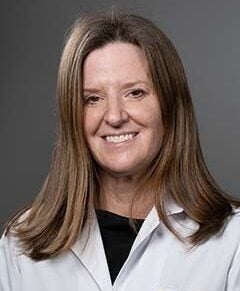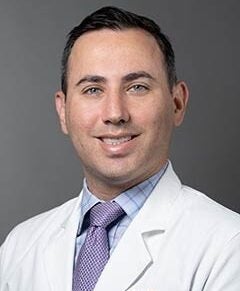About the Pain Medicine Fellowship
About
The fellow’s year on the Pain Services is spent in the (chronic) Pain Management Center (PMC) and on the In-Hospital Consult Service (CPS). Approximately 60% of the time is spent in the PMC. This time is divided between clinic, seeing 8-10 patients per day, and performing 15-18 interventional procedures per day. These procedures encompass a varied assortment of pain management techniques. The daily clinic schedule is a blend of patients new to the system and revisits. 20% of the time is spent leading the CPS which runs a daily census of 5-10 consult patients. 20% of the fellow’s time is dedicated to the ACGME mandated rotations which include physical medicine and rehabilitation, psychiatry, neurology, and anesthesiology/airway management. Fellows rotate through the services that are not their primary specialty. Generally, these rotations are two weeks long.
Education
In addition to the Anesthesiology Department Grand Rounds conferences, the didactic educational program for the fellows includes 2 hours per week of pain-related topics based upon the IASP curriculum. Attention is also paid to the continuing quality improvement; the business of pain, including reimbursement issues, characteristics and policies of the various major carriers, and awareness of the cost of various medications, therapies; and studies to encourage responsible and appropriate use of health care dollars. Fellows are expected to participate actively in the education program, by giving formal presentations and through day-to-day clinical teaching of patients, medical students, residents, referring physicians, and nurses in the course of routine clinical care.
ACGME mandated rotations:
- physical medicine and rehabilitation
- psychiatry
- neurology
- and anesthesiology/airway management.
-
Lynn Kohan, MD
Director
-
Andrew Mendelson, MD
Associate Director
-
Bhavana Yalamuru, MD
Associate Director
- Evaluating scheduled and non-scheduled patients with all types of chronic pain syndromes. The schedule demands increase progressively over the year, as the fellows gain proficiency and efficiency.
- Creating a therapeutic plan of pain management which integrates the data collected and reflects discussion with the Pain Service attending. Modalities of treatment available in the PMC include pharmacological treatment, regional analgesic techniques (single treatment and continuous) that can be diagnostic or therapeutic, neuroablative therapy using neurolytic agents and radio-frequency lesioning. The PMC is housed in the Musculoskeletal Center which allows immediate, informal consultation with Physiatry, Musculoskeletal Radiology, Orthopedics, Neurosurgery, and Physical and Occupational Therapy.
- Explaining the treatment plan to the patient and other interested parties, such as family members, legal consultants, case managers, insurance representatives, etc.
- Performing diagnostic and therapeutic analgesic procedures on selected patients.
- Establishing follow-up appropriate for the patient’s condition and facilitating scheduling with the same “treating” fellow.
- Re-evaluating the patient and providing reactive treatment, based upon the response to the initial management.
- Coordinating care with the referring physician and/or primary care physician so as to provide seamless transitions to long-term care close to patient’s home.
- Incorporating patient data into ongoing clinical studies within the PMC and the continuous data base.
- Charting all patient encounters in a timely fashion.
- In conjunction with the attending, responding to requests for reports from insurance companies, lawyers and healthcare associates.
- Serving as a resource for the pain center residents and ancillary staff when the attending is not immediately available.
- Performing the majority of the invasive analgesic procedures scheduled in the fluoroscopy suite at the PMC (or using the hospital radiology department facility) with 1:1 supervision by a pain attending.
- Evaluating all new consultations to the CPS that are called in that day (approximately 2-4 per day) and presenting them to the pain service attending. Consults may include patients of all age groups with acute, subacute, recurring, or chronic pain and patients with cancer-related pain.
- Providing follow-up/adjustment therapy to patients staying on the CPS and overseeing the implementation of recommendations previously given on consults.
- Overseeing the in-hospital course of chosen consult patients with complex pain problems and those frequently hospitalized secondary to recurring pain and for whom the CPS is repeatedly called. This service is an educational opportunity for the fellow, gives the consulting service a consistent person on the Pain Service to interact with, and prevents the unnecessary duplication of work, as these patients would otherwise be seen by fellows unfamiliar with the case and unaware of the work already put forth on the patient’s behalf.
- Scheduling follow-up appointments in the PMC for selected in-patients that are being discharged after hospitalization, or coordinating care with the primary care physician when appropriate.
- Dealing in a timely and sensible manner with administrative and political issues that arise. This is likely to include discussion with referring physician colleagues, nurses, patients, and occasionally a patient’s family.
- Acting as a valuable resource to the Acute Pain Service residents and the consulting/referring services. This may include assisting with the performance of regional analgesic procedures as needed on patients on the APS.
- Providing preoperative, intraoperative and postoperative management of patients receiving pain implantation procedures.
- Arranging selected academic conferences for the Pain Services in conjunction with the curriculum committee.
- Participating upon request in administrative meetings of the PMC attendings and/or office staff to establish changes in practice policy, office management or such other matters as they arise.
- Helping to orient residents and visiting professionals to the Pain Service protocols and resources.
- Supervising the access of medical students on rotation and visitors to the various clinical activities in the PMC and on the CPS to maximize their experience.
- Presenting in the PMC conference program (approximately 3-6 times in the year) using lecture and journal club formats.
- When appropriate, lecturing to consulting services around the medical center.
- Presenting to the core Anesthesiology departmental conference program once in the year.
- Fostering an atmosphere of scholarly discourse based upon reading and sharing articles of interest with colleagues both within and outside of the PMC. The Center’s academic program is based upon the ABA and IASP curricula for pain medicine training.
- Rotations to specialty services of PM&R/sports medicine, anesthesiology/airway (for non-anesthesia based fellows) neurology, and psychiatry are part of the ACGME requirements. These off-service rotations are approximately 2 weeks long.
- Additional elective rotations can be arranged if time permits and forethought is shown.
- Fellows are to use some of their CPS time as an opportunity to continue non-clinical/research efforts, for academic pursuits and attention to administrative responsibilities.
- Participation in clinical research is encouraged throughout the fellowship year.
- Scientific writing is expected, with faculty assistance, and can include a collaborative book chapter, a review article, or interesting case report.
- Opportunities do exist to participate in basic pain research with departmental faculty, by mutual agreement. Usually an extension of training time will be needed for intensive laboratory research.
Additional Information
For additional information, please contact the fellowship program director, Dr. Lynn Kohan, or the Pain Medicine fellowship coordinator, Lisa Morton, by phone at 434.924-9454 or by email at Anesthesiology-painmanagementfellow@virginia.edu



